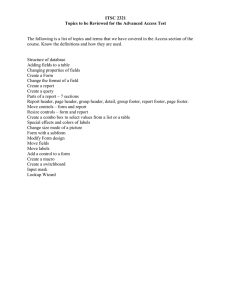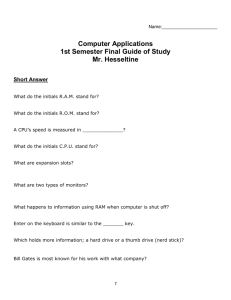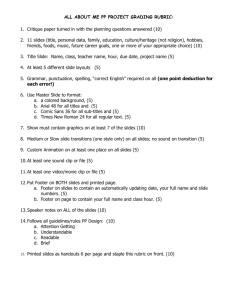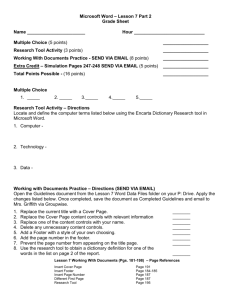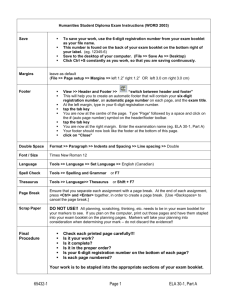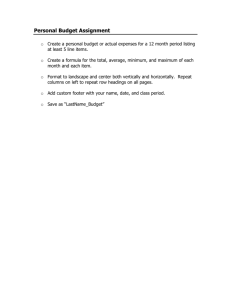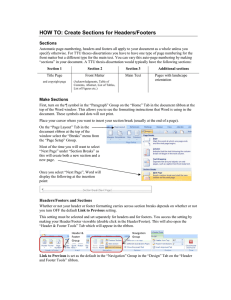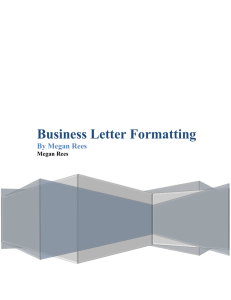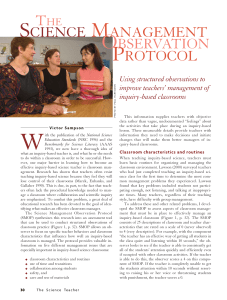APAC Government Resources PPT
advertisement
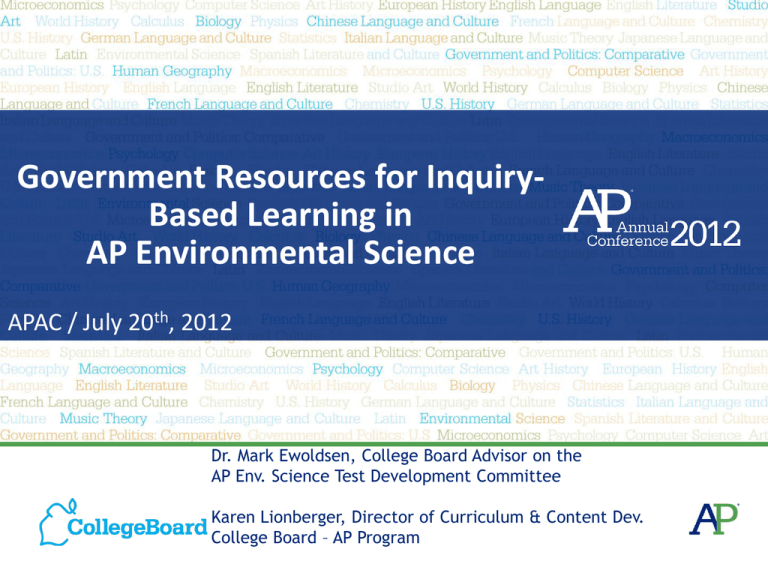
Government Resources for InquiryBased Learning in AP Environmental Science APAC / July 20th, 2012 Dr. Mark Ewoldsen, College Board Advisor on the AP Env. Science Test Development Committee Karen Lionberger, Director of Curriculum & Content Dev. College Board – AP Program Goals of the AP® Science Revision To produce a more inclusive and more engaging program of study for each AP science discipline by identifying: The concepts to be studied in depth and measured on the exams The need for a reduction in breadth of course content and an increase in depth of understanding The essential reasoning and inquiry skills that are to be supported with instruction and measured on the exams – science practices Emerging areas of research that capture essential concepts within the discipline and engage diverse student populations How do Students Feel About Labs Now? “Why do we have to learn this material?” “This is depressing...” “What is the purpose of this lab?” “How do I write the procedure?” “Are my results correct?” “Do I need to...” 2 Paradigm Shift for Students (and Teachers) 8 How “Scientific” are AP Sciences? 48 The Science Educational Reform Efforts & the “Science Practices” Compare the Science Practices for AP Science to the following: NRC’s (Common Core) Scientific and Engineering Practices 1. Asking questions (for science) and defining problems (for engineering) 2. Developing and using models 3. Planning and carrying out investigations 4. Analyzing and interpreting data 5. Using mathematics and computational thinking 6. Constructing explanations (for science) and designing solutions (for engineering) 7. Engaging in argument from evidence 8. Obtaining, evaluating, and communicating information We are all speaking the same language! “Cookbook” Labs Inquiry-Based Investigations Almost any “traditional” lab can be modified to focus on student-centered inquiry A spectrum of guidance can be given to students depending on the lab structure [Enter Presentation Name in Header and Footer] 8 The Investigation is Over…NOW WHAT? The post-lab discourse is one of THE most important aspects of the investigation….and often the most disregarded component Students should engage in rich, didactic critique of their experimental design and analysis WHY is this important? • This allows students to engage in the practice of scientific argumentation/critique • Through this discourse, student beliefs become transparent and create authentic formative assessment opportunities for teachers Gov't Resources Used in Inquiry-Based Investigations [Enter Presentation Name in Header and Footer] 10 EPA – Greenhouse Gas Emission Inventory Tables: EPA Inventory of US Greenhouse Gas Emissions and Sinks: 1990 – 2010 (Tg or million metric tons CO2 Eq) Gas / Source CO2 Total* Fossil Fuel Combustion Electricity Transportation Industrial Natural Gas Systems Waste Incineration 1990 5,100.5 2005 6,107.6 2006 2007 2008 2009 2010 6,010.0 6,118.6 5,924.3 5,500.5 5,706.4 4,738.3 5,746.5 5,653.0 5,757.8 5,571.5 5.206,2 5,387.8 1,820.8 1,485.9 846.4 2,402.1 1,896.6 816.4 2,346.4 2,412.8 2,360.9 2,146.4 2,258.4 1,878.1 1,893.9 1,789.8 1,727.9 1,745.5 848.1 844.4 806.5 726.6 777.8 37.6 29.9 30.8 31.0 32.8 32.2 32.3 8.0 12.5 12.5 12.7 11.9 11.7 12.1 1990 668.3 2005 625.8 2006 664.6 2007 656.2 2008 667.9 2009 672.2 2010 666.5 189.6 190.5 217.7 205.3 212.7 220.9 215.4 133.8 139.0 141.4 143.8 143.4 142.6 141.3 147.7 84.1 31.7 7.1 112.7 56.8 47.9 6.8 111.7 58.1 48.4 5.9 111.7 57.8 52.7 6.2 113.1 66.9 51.8 7.2 111.2 70.1 50.7 7.3 107.8 72.6 52.0 8.6 Gas / Source CH4 Total* Natural Gas Systems Enteric Fermentation Landfills Coal Mining Manure Mgt Rice Cultivation Incorporating the Science Practices Carbon Dioxide Create representations Methane 6200 680 6100 670 5900 660 5800 650 5700 640 5600 5500 630 5400 620 5300 610 5200 5100 600 1 2005 2 2006 3 2007 Years 4 2008 5 2009 6 2010 Methane Conc. (Tg / CO2 Eq) Carbon Dioxide Conc. (Tg) 6000 & models | SP 1.1 Evaluate sources of data | SP 4.4 Analyzing data to identify relationships & trends | 5.1 Evaluate evidence in data sets in relation to scientific questions | 5.3 NASA & NOAA Data Sets: Climate Change [Enter Presentation Name in Header and Footer] 13 Resources for Student-Centered, Inquiry-Based Learning Image-J Montage - Insolation 41 Image-J Animation - El Niño 42 ArcMap - Zebra Mussels 43 ArcMap Data Analysis Yellowstone Fires 45 AEJEE Earthquakes 44 Google Earth - Turtle Travel 46 NASA Instructional Modules Providing case-studies and project-based earning opportunities for students Instructional modules are grounded in real-world data that teachers can use to support inquiry-based investigations Allows students to engage in authentic problem-solving activities that incorporate both math and science principles/concepts Some modules are Pre-AP level and lay the foundation for future work at the AP level by engaging students in critical thinking activities and the “science practices” Project-Based Learning: Wheeling Creek Using Data Sets: Physical & Chemical Using Data Sets: Biological Sampling Other Data Provided: Sampling info for Crustacean, Mollusks, Annelids Includes EPT index Gives Shannon Index of diversity “Imagination is more important than knowledge. For knowledge is limited to all we now know and understand, while imagination embraces the entire world, and all there ever will be to know and understand.” 49 – Albert Einstein Link to materials today… Google Dr. E’s Science Page Open Discussion… Questions or Comments, Contact AP: Dr. Mark Ewoldsen College Board Advisor: AP Environmental Science mewoldsen@lcusd.net Questions or Comments, Contact AP: Karen Lionberger Director, AP Environmental Science, klionberger@collegeboard.org Thank You [Enter Presentation Name in Header and Footer] 28
